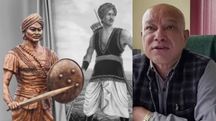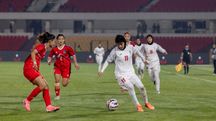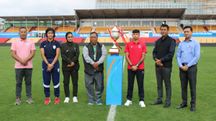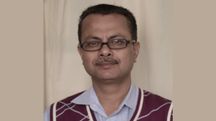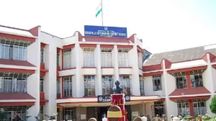Author Priyambada Jayakumar returns to Shillong to unveil biography of MS Swaminathan
When Priyambada Jayakumar began writing about her uncle, MS Swaminathan, she wasn’t just chronicling the Father of the Green Revolution—she was uncovering the heart behind India’s food security.
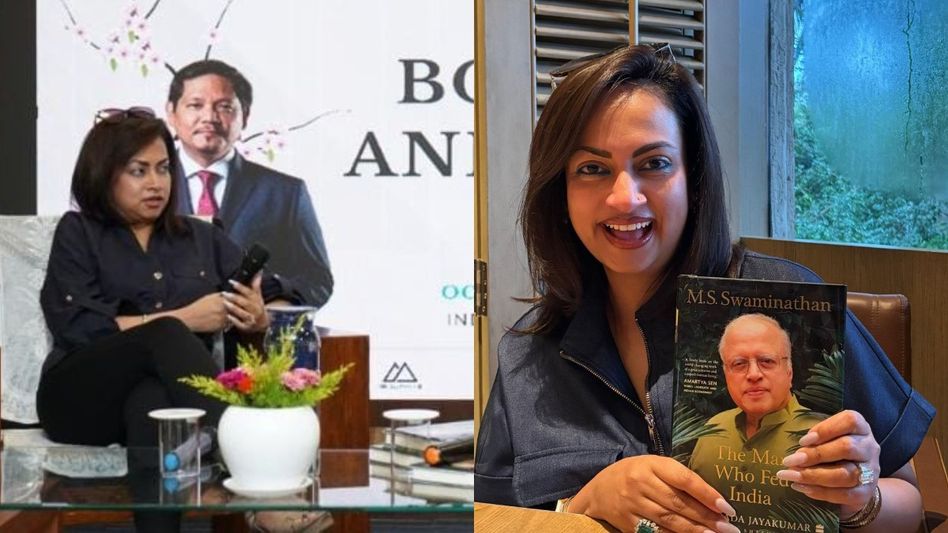
Ahead of the Shillong Literature Festival 2025, author Priyambada Jayakumar launched her book “MS Swaminathan: The Man Who Fed India” at the Indian Institute of Management (IIM) Shillong. The book, released as a centennial tribute, celebrates the life and work of her uncle, the late Professor MS Swaminathan—India’s legendary agricultural scientist hailed as the Father of the Green Revolution.
Jayakumar, who is Swaminathan’s niece, was born to a Tamil father and Bengali mother and raised in Kolkata. With family roots in Shillong, she described her visit as “nothing short of a homecoming.”
Recalling her family’s history, she said, “My mother was born here. My grandparents lived in Shillong in the early years of their marriage. My grandfather was a barrister, and he was working here. My mother and aunt were born here before they left for Calcutta, and my grandfather had a store in Police Bazaar called Jasmine Stores. The people here have been astoundingly warm, kind, and amazingly hospitable. So, it is pretty much a homecoming.”
Speaking about what inspired her to write the book, Jayakumar said, “This is not the first book that has been written about MS Swaminathan. There are several books that have been written, but every book on MS Swaminathan used to focus purely on his agricultural footprint. I don’t think they pretty much unravelled the man behind the agricultural transformation. So, I wrote a book that I couldn’t find in the market.”
She began writing during the COVID-19 lockdown in Singapore in 2020. “I came across a tweet by him on the migrant crisis, when everybody was walking with their lives on their backs. He spoke about a time when India’s struggles were far from over in the 1960s, and I felt that, though I’d read so many books about him, I didn’t know the stories behind those transformations. I wanted to bring out the man behind the revolution,” she said.
Jayakumar explained that it took her two years to complete the book — one for research and another for writing. “The size of my original book was actually 700 pages, but we had to trim it because there was too much data. You can’t have a very data-heavy book, because then the stories get lost. I basically extracted the human essence and human stories from all that and put them into a book. It’s not an agricultural book. It’s a book for general audiences—anybody who’s curious—and it’s essentially written to inspire,” she said.
Describing her uncle’s legacy, Jayakumar said, “M.S. Swaminathan was so much more than just an agricultural scientist. He was a Gandhian, a humanitarian, and a diplomat. He is the most awarded and recognised Indian since Mahatma Gandhi. He has been given national awards by 44 different countries and high civilian awards by several others. He was a feminist, an ecological crusader, and I wanted to bring out all these different facets of his personality.”
Reflecting on his work with farmers, she recalled, “The fact that farmers would fight amongst themselves over who should give him lunch or dinner, because he was so popular. Despite being that popular, it took him about seven weeks to break through, to get that one farmer with that one intrepid streak in him to say, ‘You know what, I have been seeing you come for so many weeks. You’re coming on Saturdays, Sundays, public holidays, and even Independence Day. Obviously, you’re not getting paid for this. So, you must believe in what you’re telling us. I will take those seeds, and I will try.’ And that was that one leap of faith—that one farmer who precipitated a huge transformation.”
Discussing the impact of the Green Revolution, she said, “One thing that MS Swaminathan always upheld in his life was that agriculture was seen as mired in doom and gloom. He wanted to bring agriculture into prosperity. When I was at the Kasauli Lit Festival, I actually had farmers come up to me and say that because of the Green Revolution, they had seen money and prosperity. It was not just an agricultural transformation; it also transformed lives in terms of prosperity and access.”
Jayakumar also emphasised his global contributions. “He was not only a famine warrior for India, but also a famine warrior for the world. He went to the Philippines; he was the first Indian Director General of the International Rice Research Institute in Los Baños near Manila, from 1982 to 1988. He helped Cambodia revive its rice fortunes, which were wiped out by Pol Pot. Similarly, he helped Vietnam, Laos, China, Pakistan, Afghanistan, and North Korea,” she said.
She added, “He was offered an administrative position at the FAO in the 1970s, which he declined because he felt his country needed him more than any international organisation that could have offered him a greater salary and benefits. He chose to remain in India and help his country. He started his foundation because C.V. Raman, the Nobel laureate, once told him to start one of his own. It was a promise he made to C.V. Raman that later became the M.S. Swaminathan Research Foundation. Every award he received, and all the prize money, were collected to build that foundation.”
On the lessons policymakers could draw from his life, Jayakumar said, “The greatest lesson of M.S. Swaminathan’s life was that science without humanity was a wasted effort. What policymakers need to understand is that policy without humanity, too, is a wasted effort. Do not forget—his revolution and transformation happened with the poorest farmers first. He never went to the richest. It was a bottom-up approach to development, which he championed throughout his life. Any sort of development or policy must be egalitarian, accessible, humanitarian, and democratic for it to succeed.”
Jayakumar revealed that she has been approached to write two more biographies. “Yes, I have been asked to write two biographies by two different publishing houses, and I’m just wondering which one I should take up. At this point, my greatest focus is to make this book successful—to take MS Swaminathan’s story, especially in his centennial year, to every part of India,” she said.
Her upcoming events include launches in Chennai on 2 November, the Shillong Literature Festival, and Kochi. “There will also be state-level launches, especially in states relevant to his work and research. As always, the endeavour is to get the word out—to get the stories out—and to get people reading, thinking, and hopefully transforming,” she added.
Hinting at possible screen adaptations, she said, “Bollywood is looking at turning this into a film or a series. So that’s the next stage for the book—to be able to reach out to a larger audience.”
On her plans as an author, she added, “You will have to catch me on social media to find out what the next one is and when it's going to be deployed.”
Copyright©2025 Living Media India Limited. For reprint rights: Syndications Today
